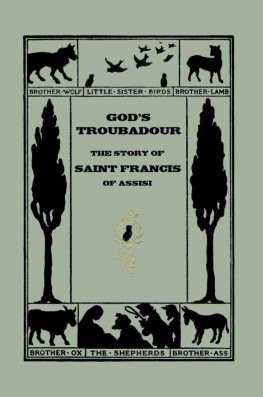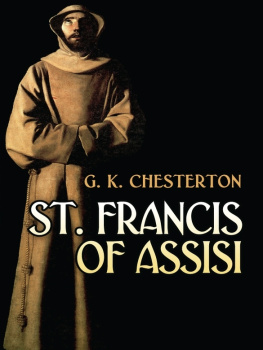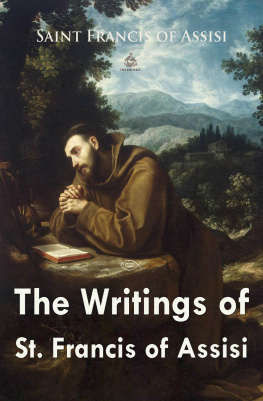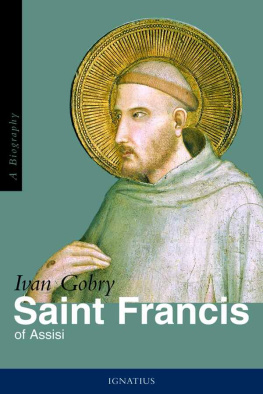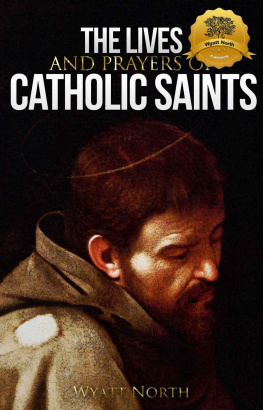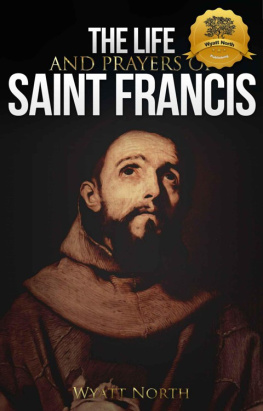God's Troubadour, The Story of St. Francis of Assisi
by
Sophie Jewett
Yesterday's Classics
Chapel Hill, North Carolina
Cover and Arrangement 2010 Yesterday's Classics, LLC
All rights reserved. No part of this book may be reproduced or retransmitted in any form or by any means without the written permission of the publisher.
This edition, first published in 2010 by Yesterday's Classics, an imprint of Yesterday's Classics, LLC, is an unabridged republication of the work originally published by Thomas Y. Crowell & Company in 1910. This title is available in a print edition (ISBN 978-1-59915-055-0).
Yesterday's Classics, LLC
PO Box 3418
Chapel Hill, NC 27515
Yesterday's Classics
Yesterday's Classics republishes classic books for children from the golden age of children's literature, the era from 1880 to 1920. Many of our titles are offered in high-quality paperback editions, with text cast in modern easy-to-read type for today's readers. The illustrations from the original volumes are included except in those few cases where the quality of the original images is too low to make their reproduction feasible. Unless specified otherwise, color illustrations in the original volumes are rendered in black and white in our print editions.
Contents
A Child of Long Ago
"He prayeth well, who loveth well
Both man and bird and beast.
"He prayeth best, who loveth best
All things, both great and small;
For the dear God who loveth us,
He made and loveth all."
Coleridge.
U NDER the arched gate of a city wall, a group of people stood watching the road that wound down the mountain and off across the plain. The road lay dusty and white in September sunshine, and the eyes of the watchers followed it easily until it hid itself in a vast forest, that filled half the valley. On the point where road and forest met, the sharpest eyes were fixed.
The crowd was gay, but not noisy. There were few words and long silences, as always when people are waiting and expecting. Among all the eyes that watched the sunny road that day, the most earnest were those of Madonna Pica Bernardone, and the merriest were those of her little boy Francis, for the company was gathered to see the home-coming of Messer Piero Bernardone, the richest merchant of Assisi, and the lady Pica was his wife, and little Francis was his son. The others were friends and neighbours of Piero. Some were rich customers, who wondered if the merchant had found for them the beautiful stuffs which they had ordered. Certain of the company were only idlers, glad enough to have something happen to break the dulness of the long, warm afternoon.
Assisi, at whose gate the watchers stood, lies far across the sea in beautiful Italy. It is a little city, built on a mountain side, with a great wall all about it, and a castle on the height above, and it looks very much as it did on that September afternoon more than seven hundred years ago, when Francis Bernardone waited for his father. Inside the walls, the stone houses are crowded together, making narrow, crooked streets, so steep, often, that no carriage can drive through them. Some streets, indeed, are simply long flights of stone steps, where the children play, and the patient donkeys climb up, carrying heavy loads of charcoal or faggots. But, though the streets are narrow, Assisi is not gloomy. Everywhere there is sunshine and bright colour. Above the brown tiled roofs rise tall green cypress trees; over a bit of garden wall trail red trumpet-creepers and blue morning-glories; even the window-sills are gay with pink and red geraniums. In the open square the market-gardeners sell ripe grapes and plums and figs, covered over with fresh vine-leaves. Outside the city gates, all the world seems like a fair garden. The hill-sides are covered with olive trees, whose grey leaves twinkle like silver when the wind blows through them. Some of the trees look almost as old as the city walls, for their trunks are only hollow shells through which one sees the blue sky, though their tops still bear fruit bravely every year. From the foot of the mountain stretches the river valley, bright with wheat fields and tall corn, and vineyards where the vines hang in heavy garlands from one mulberry tree to another. Between the rows of trees, in the shadow of the vines, great white oxen move slowly, dragging a clumsy, old-fashioned plough; and down a sunken road that cuts through vineyards and cornfields go strong, brown peasant women with burdens on their heads.
Little Francis Bernardone must have trotted up and down the same steep streets, and have played in the same squares that one sees to-day; but the valley over which he looked, on this autumn afternoon, contained fewer vineyards and cornfields, and far more forest trees. Francis wondered what might lie hidden in the forest, for he had never travelled beyond the place where the white road disappeared.
The hour grew late, and the tired watchers shaded their eyes from the low sun that shone across the valley from the western mountains. Suddenly Francis shouted aloud, and, in a minute, the shout was taken up by many voices: "He is coming! He is coming!" They saw, at first, only a cloud of dust, moving along the road; but soon, horses and riders could be discerned, in a long line, half-hidden still by the dust that rose in their path and turned to gold and crimson haze in the red sunset.
As the horsemen climbed the hill to the city gate, the sight was more like the coming of a prince than of a merchant. Piero Bernardone rode ahead, in a company of soldiers, well armed and mounted upon fine horses. Behind this group followed a train of pack-horses and mules, heavily loaded with the rich goods that the merchant was bringing home. Last of all came another band of soldiers, some mounted, some on foot. All this escort was customary for a rich merchant in those days, for the roads were often held by wandering bands of soldiers or highway robbers. Piero Bernardone needed many swords to defend the silks and velvets, gold embroideries and jewels which he had bought in the great market towns of France and northern Italy.
At the gate of Assisi, Piero Bernardone dismounted gravely. He kissed the Lady Pica and the little Francis; he greeted his friends, somewhat coldly, perhaps, for he was a proud, hard man; but he turned a second time to kiss his boy, whom he loved dearly. Then Francis knew the proudest minute of his little life; for he was mounted upon his father's horse, while Piero and the Lady Pica walked beside him, and all the company, talking eagerly, entered the gate of San Pietro, and wound slowly up the stony streets that led to Piero Bernardone's home.
Inside the house, that night, Francis listened with wide eyes to his father's stories, for the merchant had always interesting adventures to tell. He had visited the great fairs, to which other merchants came, from Greece, from Africa, from Syria, from Germany and England. While he bought and exchanged goods, he heard news from all over the world, a world in which news travelled slowly, for there were no newspapers, nor telegrams, nor railroad trains.
On his way homeward the merchant was a welcome guest at the castles of knights and princes. Noble ladies bought his silks and laces, famous warriors begged him for tidings of wars in other lands, and all listened to any new stories which he had learned on his journey.
Of all the merchant's hearers none was so eager as his son Francis. For him the stern Piero remembered all the strange and beautiful tales that he heard by the way; stories of Charlemagne and Roland; of King Arthur and his Knights of the Round Table. For him he learned the gay songs of the wandering poets, Troubadours, as they were called, who sang in the courts of kings and in the halls of nobles. Their songs were of brave knights in shining armour, and of ladies with white hands, beautiful eyes, and sweet, unforgettable names. Piero Bernardone cared little for the courtly words of these Troubadour songs, but, as he listened, he remembered the clear, childish voice at home, always quick to repeat new verses and new melodies. So Piero was glad when he heard the same song many times of an evening; and, next day, in the saddle, while he thought of prices and profits, his rough voice sang, over and over, daintily fashioned rhymes in praise of Isoline and Blanchefleur, of Beatrice and Amorette.

